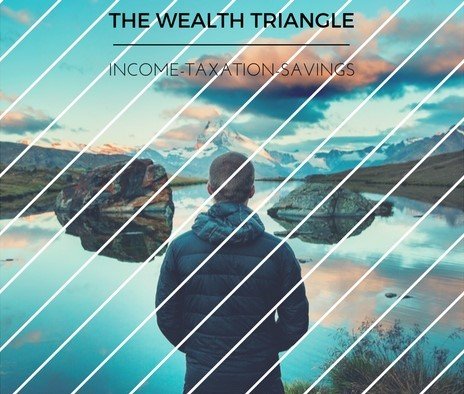The Wealth Triangle- Maximise Your Income, Minimise Your Tax and Boost Your Savings

Everyone wants to get ahead in life. Monday to Friday we charge towards this goal, dutifully serving our employers and banking that hard earned dollar. Sometimes it’s the ‘banking’ part that seems to take a back seat. Ever checked your mortgage statement and wondered where on earth it all went? “I earn $97,000. Why are we no better off than last year?”
This post will examine three ways to build your wealth. They are-
• Growing your income,
• Reducing your tax liabilities, and
• Saving for the future.
You could think of each of these areas as representing the sides on a triangle. A triangle is structurally known to be the strongest of all the two-dimensional shapes. It is used in most engineering structures to enhance rigidity and provide strength. However, if one side is weaker than the other two, the integrity of the triangle remains in jeopardy. This is no different to the wealth triangle. All three sides need to be fully optimised to build your personal wealth successfully.

When all three sides are optimised effectively we could expect to see our wealth to grow exponentially. It may not result in overnight millionaire status, but think 5, 10, 15 years into the future the difference it could make. Imagine you took steps to be proactive about your financial future back when you were 20. Where would you be now?
Let’s unpack each aspect of the wealth triangle in detail…
Income
Income can be derived from a variety of sources. For most of us, it typically arrives through our wages. Growing your income through your salary can be a very difficult endeavour without completing further studies to improve your specialisation, making drastic life changes such as working remotely or through elongating the daily hours that you work. The only problem with this form of income is that it has one massive weakness… you! This method can work great if you are in a high paying job, but suppose you decide to take a 6-month sabbatical and watch what happens to your income stream.
The ideal way to develop lasting and exponential income is to structure a business or set of investments that have the potential to run independently. These are probably not something that we commonly think of as a typical ‘income source’ however. We have all bumped shoulders with a few people who worked on a side business that seemingly exploded overnight. Likewise, we probably could point to a few people who ‘got lucky’ on Microsoft shares back in the 80s or those who short sold Lehman Brothers in 2008. We tend to chalk up these stories as providence and await, fingers crossed, for the same thing to occur to us.
Let’s entertain the fact that developing this form of income is something that we proactively want to pursue. The first step towards this endeavour is to educate yourself. Think about a business idea that may have been on the backburner for a while. Maybe you have a passion for real estate renovations or an interest in the financial markets. It is not within the realm of this post to list all the possible options. There are many roads to wealth creation and it just helps to keep pondering them in your mind. Eventually possibilities will begin to unravel as you learn more and more about business and investment. One of the best pieces of advice I have heard is to find a problem and deliver a solution.
Personally, I have not created a functional business that generates sizeable income. This is still something I am working towards. What I have been concentrating on is investing in financial markets and developing a real estate portfolio. I will categorically say that I am no millionaire but I can testify to the fact that I have never lived better, nor had a brighter financial outlook since channelling 30% of my income and every spare hour into strengthening this area.
Tax Minimisation
Tax avoidance winds you up in jail or with a hefty fine. Tax minimisation, however, is the duty of each and every person. No one scrutinising your tax return at the Tax Office will ever call you up to suggest a better way to structure your tax obligations. The Australian Tax Office states that each individual has ‘the right to arrange your financial affairs to keep your tax to a minimum.’ The onus is on you, the tax payer, to keep your tax to a legal minimum.
I believe that the best way to tackle this problem is to have an annual, or even better, quarterly appointment with an accountant. Arrive and deliver a barrage of questions. “Can I do this? What if I tried this?” Your accountant will be able to fill you in with up to date information on current tax laws. I’ve tried a few accountants and experienced a wide gamut of services. The greatest attributes they should possess is that they themselves should be continual learners and as well as fabulous teachers. Not all accountants will suit each person. You may need to consult an expert in corporate tax or one who is particularly skilled in managing foreign investments.
It pays to keep an ear to the ground as far as different tax structures are concerned and read the financial news. Laws and statutes change from time to time. If you are planning the sale or purchase of a significant asset, I would always encourage you to see a tax professional beforehand. My accountant charges me $160 per hour. Every meeting I have held with him has always delivered at least 10 times the tax savings.
As a little rant I feel very strongly about unfair taxation. Why does a hardworking, average earning family get taxed at 32.5%, whereas 38% of Australia’s largest entities pay no tax in Australia? [Source: http://www.smh.com.au/business/the-economy/which-of-australias-biggest-companies-are-not-paying-tax-20151216-glpl3a.html]
Structure your tax so that you, as a hard working person, are given a fair deal. If you feel differently about the topic, then the ATO always welcome additional donations.
Savings
One of the words of wisdom from the ‘The Richest Man in Babylon’ that I loved was a passage which said ‘A part of all I earn is mine to keep.’ Remember the importance of paying yourself with money that you will keep for the long term. This means placing your after-tax money into assets that at worst, maintain their value. Ideally they should appreciate but this can be a grey area given the volatility of global economies.
The term ‘investment’ can cause our fear and greed glands to palpitate. We hear of stories of people who turned $10,000 into $10 million as well as those who lost their life savings at the age of 60. A word of caution is to be extremely careful with where your hard earned money is placed. A term deposit in today’s banking system is a loss because inflation exceeds the interest. Bank in Switzerland and you need to pay them to leave a deposit!
In Australia people are sinking every last penny (or cent) into real estate thinking the good times will never end. I’m no property expert but I do statistically weigh up the odds. Australia has celebrated 25 recession free years. The world record is held by the Netherlands who boasts 26 consecutive years. [Source: http://www.news.com.au/finance/business/breaking-news/gdp-forecast-to-rise-04-in-june-qtr/news-story/6433009d572d769c5b738888330e0e6b] While things could remain all hunky-dory for another decade, the odds concern me slightly as an investor.
Investing in anything always carries risk. No risk equals no returns. There’s no point putting your money into something that will keep you up at night. While I cannot give advice technically on this site, I would say that any investment warrants a substantial investment of time. If you are to sink $100,000 of your after-tax money into a fund, a time investment of 30-40 hours should not be out of the question. If you cannot afford the time, or doubt yourself, find an expert such as a financial advisor. Be careful of the fees and understand that an advisor will usually direct you towards stocks or funds because the commissions are easily obtainable. Real estate is a little less easy to precisely quantify, harder to buy and sell in a hurry, and has substantial entry and exit costs. Hence why financial advisors typically funnel you into exchange traded assets.
Back to the Triangle Analogy…
On a personal note, it has only been over the past few years that I can honestly say that I have strengthened this ‘triangle’ adequately. It will always continue to be a work in progress. The triangle will require modification as your wealth increases, as economic conditions change and through the natural process of time. By spending less than you earn, investing a portion for the future and enjoying life along the way, you can rest assured that your wealth triangle is reinforced. Once all 3 sides are strengthened, you can know that you are doing everything within your capability to put your financial future in good stead.
Please note that this post originally appeared on my blog [http://www.budgetbrilliance.com/the-wealth-triangle-maximise-your-income-minimise-your-tax-and-boost-your-savings/]
Congratulations @mattmacreadie! You have received a personal award!
Click on the badge to view your own Board of Honor on SteemitBoard.
For more information about this award, click here
Congratulations @mattmacreadie! You have received a personal award!
Click on the badge to view your Board of Honor.
Congratulations @mattmacreadie! You received a personal award!
You can view your badges on your Steem Board and compare to others on the Steem Ranking
Vote for @Steemitboard as a witness to get one more award and increased upvotes!